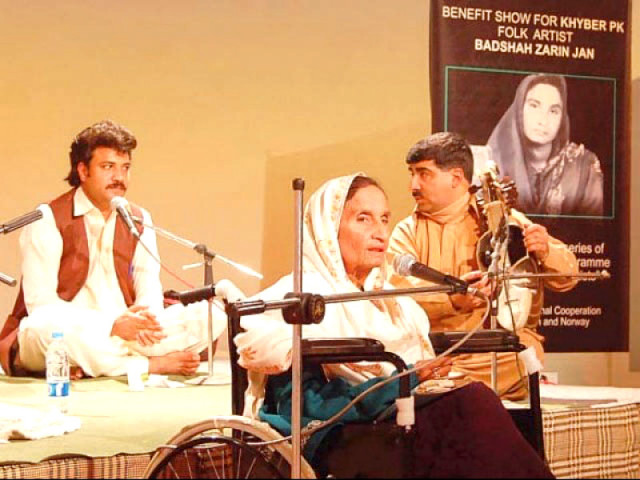A legend fades: The Queen of Pashto ghazals passes away
Bacha Zarin Jan could perform in multiple languages.

Known as the queen of Pashto ghazals and ruling the hearts of millions in her heyday, Bacha Zarin Jan passed away after prolonged illness early morning on Wednesday, in her rented house in Peshawar’s Bakhshu Pul area.
Zarin Jan, popularly known as Bibi Gul, was among a rare crop of singers who not just held command over the seven Surs, but also possessed a versatile diction enabling them to sing in various languages. In Zarin Jan’s case, these included Pashto, Hindko, Punjabi, Seraiki, Potohari, Urdu and Persian. Her music was popular with both Pakistani and Indian listeners.
Born in Kalpanay area, Par Hoti, Mardan in 1942, music ran in Zarin Jan’s blood – her father, Ustad Abdur Rahim Khan was a well-known musician from Calcutta. To her misfortune though, she never saw him. Despite this, her musical education continued and she went on to learn Pashto music and ghazal from the likes of Ustad Gul Pazir Khan and Ustad Ghulam Fareed Khan from India.
From the Tamgha-e-Imtiaz to a lifetime achievement award, the 71-year-old maestro had an illustrious career as a singer, which started at the tender age of seven. Her debut song ‘Gila da Khpalo keegi Nakri sook da pradoo na gila’ (complaints are made to the ones you know, not to strangers) introduced her as a child artist on radio Pakistan in 1948.
Jan sang countless songs among them, ‘Rao ra Bandai Bandai che opelu na’ ‘Za Pana Walarha yama’ ‘Halaka balai ma narhawa leeday ma na shay’ and ‘Allah ho sha Allah ho’ are popular.
Her glorious career was in sharp contrast to a turbulent personal life. She also suffered from a host of medical problems which eventually led to her demise.
Just a few days before she passed away, Zarin Jan talked to The Express Tribune: “My elder sister had a terrible experience after marriage… I could not imagine myself going through that, so I devoted my life to my first love, music.”
“Every queen has her fall, maybe that is why I can hardly make both ends meet,” she added.
Living in a congested house, her weak persona attracted more attention than the awards she garnered which sat unnoticed on a mud wall.
Pashto singer Bakhtiar Khattak termed her death a great loss to Pashto music. “She was the backbone of Pashto folk music. Unfortunately, we could not serve her the way one should serve legends,” he said.
Legendary Pashto singer Hidayatullah, meanwhile, eulogised “She will always be honoured for contributing immensely to the Pashto music industry.”
Published in The Express Tribune, July 26th, 2012.












COMMENTS
Comments are moderated and generally will be posted if they are on-topic and not abusive.
For more information, please see our Comments FAQ